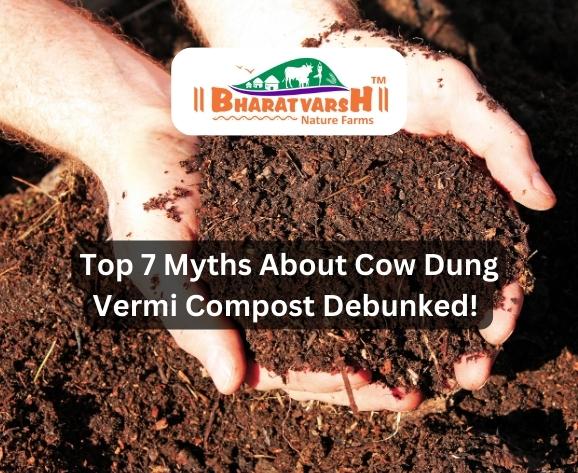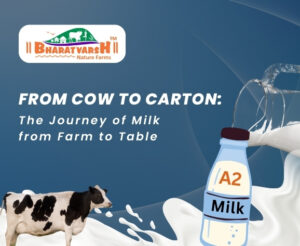Cow dung vermicompost is hailed as a miracle worker in organic farming and sustainable agriculture. This nutrient-rich, eco-friendly, and cost-effective soil conditioner has gained immense popularity.
However, like many things, it has its fair share of myths and misconceptions. In this comprehensive guide, we aim to debunk the top 7 myths about cow dung vermicompost, shedding light on the reality and benefits of this natural fertilizer.
The Basics of Cow Dung Vermi Compost!
Cow dung vermicompost, also called worm composting or vermiculture with cow dung, is a natural process where earthworms break down organic material, including cow dung, into nutrient-rich compost. As per the Food and Agriculture Organization (FAO), vermicompost improves soil structure by up to 25% and increases water-holding capacity by 30%.
This nutrient-rich compost is an excellent fertilizer, improving soil structure and promoting plant growth. Now, let’s tackle the myths and misconceptions that surround it.
Moving ahead, let’s discuss,
Top Cow Dung Vermi Compost Myths Debunked!
Here are some: –
Myth #1: Cow Dung Vermi Compost Stinks
One of the most common misconceptions about cow dung vermicompost is that it emits a foul odor. In reality, adequately composted cow manure has a mild, earthy scent. The stench typically associated with cow dung arises from improper storage and handling. When composted correctly, cow dung vermicompost is not only odorless but also valuable to your garden.
Myth #2: Cow Dung Composting Is Unsanitary
False beliefs about cow dung composting often revolve around hygiene and safety concerns. The truth is that vermicomposting, the process of using worms to decompose organic matter, is a highly efficient and sanitary method.
The Environmental Protection Agency (EPA) reports that organic waste constitutes nearly 30% of the waste stream, which can be significantly reduced through vermicomposting.
The worms in the composting bin are specific species that thrive on organic waste. They help break down cow dung into nutrient-rich castings, eliminating harmful pathogens.
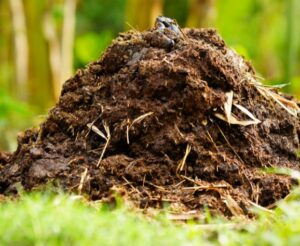
Myth #3: Cow dung vermicompost is ineffective as a fertilizer
Skeptics argue that cow dung vermicompost is nothing more than glorified cow waste. They doubt its ability to provide the necessary nutrients for plant growth.
Cow dung vermicompost is a nutrient-rich fertilizer that increases soil fertility and promotes healthy plant growth. It contains organic matter, beneficial microorganisms, and essential nutrients like nitrogen, phosphorus, and potassium. Many farmers and gardeners swear by its effectiveness in boosting crop yields.
Myth #4: Cow Dung Compost Is Only for Large Farms
Many gardeners believe that cow dung vermicompost is suitable only for large-scale agriculture. This misunderstanding often discourages home gardeners. Cow dung vermiculture can be practiced in small gardens, balconies, or indoor planters. It is adaptable and can indeed be tailored to suit the needs of any gardener, regardless of the available space.
Myth #5: Cow Dung Vermi Compost Harbors Harmful Insects
Another common myth is that cow dung composting attracts pests and harmful insects. While it’s true that any organic matter can attract insects, proper management of vermicomposting bins can mitigate this issue. In reality, vermicomposting systems create an environment inhospitable to many common garden pests, and with reasonable precautions, you can maintain a healthy and insect-free composting system.
Myth #6: Vermicomposting Is Time-Consuming and Labor-Intensive
Some gardeners shy away from cow dung vermi composting due to the misconception that it’s a time-consuming and labor-intensive process. However, once the system is set up, it requires minimal effort. Worms are highly efficient in breaking down organic matter, and maintaining a composting bin can be as simple as feeding them periodically and ensuring the right conditions are met.
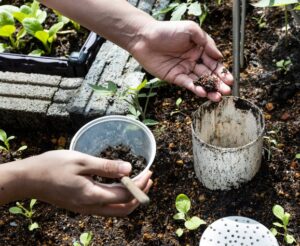
Myth #7: Vermicomposting Is Not Environmentally Friendly
Many people believe that cow dung vermicomposting harms the environment. This couldn’t be further from the truth. Vermicomposting is an eco-friendly method that reduces waste and greenhouse gas emissions. It diverts organic matter from landfills and provides a sustainable way to enrich the soil without depleting natural resources.
Key Takeaways
- Cow dung vermicompost could be more stinky when adequately managed.
- Vermicomposting is a sanitary method that eliminates harmful pathogens.
- Cow dung vermicompost is more effective and sustainable than chemical fertilizers.
- It can be practiced in small spaces, making it accessible for home gardeners.
- Properly managed vermicomposting systems deter harmful insects.
- Once set up, vermicomposting is a low-maintenance process.
- Vermicomposting is an eco-friendly way to enrich soil and reduce waste.
FAQs
Q: Does cow dung vermi compost smell bad?
A: No, it doesn’t. When managed correctly, cow dung vermicompost has a mild, earthy scent similar to fresh soil.
Q: Can vermicomposting with cow dung attract pests?
A: Properly maintained systems deter pests. Worms consume organic matter rapidly, leaving little for pests to feed on.
Q: How long does it take for cow dung to become vermicompost?
A: Under ideal conditions, earthworms can turn cow dung into nutrient-rich compost within a few months. The speed of decomposition depends on factors like temperature, moisture, and the worm population.
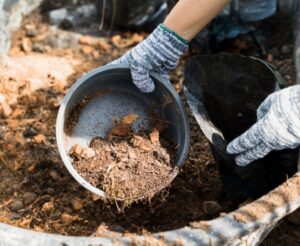
Q: Is there a risk of harmful bacteria in cow dung vermicompost?
A: No, vermicomposting conditions are not suitable for dangerous pathogens. The high acidity and rapid decomposition deter the growth of harmful microorganisms.
Q: Can city dwellers practice vermicomposting with cow dung?
A: Cow dung vermi compost can be practiced in urban and suburban areas using small-scale, indoor composting setups. Even apartment dwellers can engage in vermicomposting with minimal space requirements.
Q: Is vermicomposting complicated?
A: No, it’s not. With a basic understanding of the process, anyone can create a successful vermicomposting system.
Q: Is cow dung vermi compost adequate for improving soil fertility?
A: Absolutely. Cow dung vermicompost is an incredibly effective and eco-friendly way to enhance soil fertility, providing essential minerals and beneficial microorganisms that boost plant growth.
Conclusion
Cow dung vermicompost has been subjected to numerous misconceptions over the years. However, this blog has debunked the top 7 myths surrounding cow dung vermicompost and provided you with the facts. Cow dung vermicompost is not only odorless but also does not attract flies or pests.
It is an incredibly effective fertilizer that is easy to produce and maintain. Contrary to popular belief, it does not contain harmful pathogens and is suitable for various types of gardening practices. Plus, it is a cost-effective and environmentally friendly option. So, don’t let the myths hold you back from enjoying the benefits of cow dung vermi compost in your garden.
Read More: THE ULTIMATE BUYER’S GUIDE: BEST PLANTS FOR ROOF TOP GARDENS – Bharatvarsh Nature Farms

